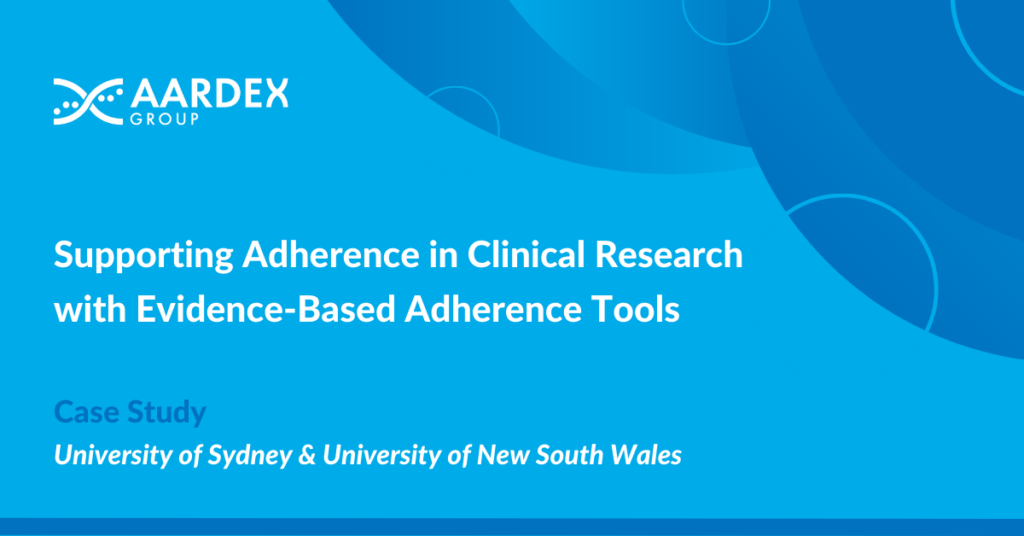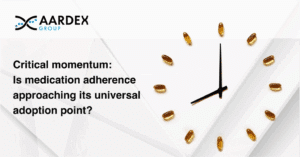Clinical research can stand or fall on the adherence to trial medications – even the most efficacious interventions will fail if people do not take their medicines as prescribed.
That’s why researchers from the University of Sydney and the University of New South Wales, Australia used AARDEX’s digital solutions to verify adherence to medication among 31 people living with gout during a clinical research project. The pilot proved so successful that the team is now planning to use the system in a new study of more than 500 participants across Australia with gout.
In this case study, we look at how frictionless digital Medication Adherence Tools are proving to be a trusted, cost-effective way to keep patients on track – and on drug – during clinical research.
Medication Non-Adherence – A Notorious Problem in Clinical Research
Medication non-adherence is a notorious problem in clinical research. When people do not take the investigational drug as set out in the protocol, it can lead to underestimations of efficacy and drain study power, even to the point of study failure.
Traditional, inaccurate measures of adherence, such as pill count or self-report have been replaced with digital alternatives in recent years. While these solutions hold great promise, many add barriers to adherence for patients.
Some, for example, require bespoke devices, adding to the cost of clinical research. Others ask people to record and submit videos of themselves taking their medicine, or require them to fill in eDiaries. Paradoxically, these add to the patient burden, making poor adherence more, not less, likely.
In many cases, little emphasis is placed on the User Experience (UX) of the medication adherence measures. The resulting usability issues can deter people from using the platforms, canceling out any benefit.
The study
The University of Sydney and the University of New South Wales designed a study to determine whether the self-monitoring of serum uric acid concentrations improved adherence to the urate-lowering drug allopurinol among people living with gout.
The project, which started in April 2021, enrolled 31 people who are being followed up for one year.
To generate reliable results, they needed a robust, evidence-based method to measure medication adherence. It needed to be easy to use and, to fit their budget, the solution also had to be cost-effective.
Smart Pill Bottles
The team used AARDEX’s MEMS® Cap, a customizable smart pill bottle that records timestamps when the medication bottle is opened. As of today, 842 clinical studies have used this technology to successfully record patients’ adherence to medication. In addition, the MEMS® Mobile for Research app was used by the participant to transfer dosing information to the medical team. Participants downloaded the app to their own phones, part of a Bring Your Own Device (BYOD) model that kept costs to a minimum.
Study participants used the app to read data from their smart pill bottles. This triggered the automatic transmission of medication intake timestamps to the MEMS AS® software. This allowed the team to collect and review dosing information in real-time to spot erratic dosing patterns and provide additional support when needed.
The outcome
Leo Chan, at the University of New South Wales, said: “Overall, the app has been a big help in monitoring patients adherence behaviour. We have been able to flag any concerns with medication safety, and check-in with participants when adherence data was unusual.”
During the study, 27 people took part in a feedback survey on the app. It found that all respondents rated the app’s usability as being between 16 and 39 out of 40, with more than 50% (n=15) rating it as between 25 and 39 out of 40.
What’s next?
The team now plans to use the MEMS® system to monitor adherence to allopurinol among people with gout across metropolitian, regional and rural Australia. If funding applications are successful, the study, will start in January 2023 and include more than 500 people with gout in Australia.
Medication packages will be fitted with AARDEX Group’s smart pill bottles, MEMS® Caps, which can be read via the participants’ smartphones.
Site teams will also be provided with tablets to access the MEMS AS® platform. This will enable them to log on and deliver interventions as and when they are needed.
Results are expected at the end of 2025.



